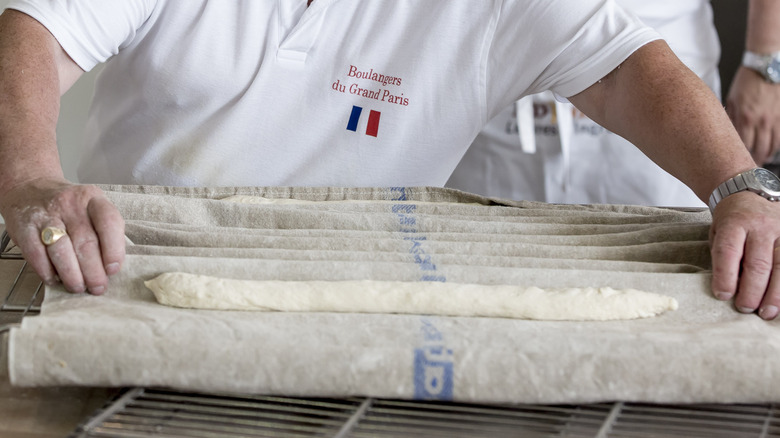The Specialty Linen That Will Help Proof Homemade Baguettes
There seems to be no way of thinking about France without the image of a baguette popping into various idealized dining scenarios. This may sound stereotypical, but it's not. In France, the baguette is revered and can be found in high-end Parisian bakeries or for less than a Euro a loaf at the corner Carrefour. It is so popular and beloved that, according to The New York Times, over six billion loaves are baked yearly. UNESCO has even honored it as a product of intangible heritage, citing the country's "artisanal know-how and culture of baguette bread."
The baguette stands not only as a symbol of France but as a product of genuine quality. Therefore, it is no wonder that so many of us try to replicate the magic in our kitchens. A proper baguette can be tricky to achieve at home, but with a bit of know-how and the right gear, you'll be baking light, crispy loaves in no time.
One such item is the specialty cloth French bakers use to proof their baguettes. A video from Insider demonstrates that, once the dough is shaped, the characteristically long loaves are sandwiched together between the folds of a heavily floured, long piece of linen. This item is known as a couche, and they are straightforward to find, provided you know what you're looking for.
The wonders of linen
Having a couche at home can help you handle and even shape the dough, but it is mainly used to help achieve that desired crispy crust (King Arthur Baking). Because the canvas on which the bread rests during proofing is breathable and absorbent, it helps the dough dry evenly, applying a thin, floury film on the dough as it expands. The couche also prevents the baguettes from sticking to each other while rising. As a result, the dough should easily transfer off the canvas to a baking sheet.
A couche is a strong, durable, flexible material that is highly absorbent and easy to care for, per Bibico UK. However, you must ensure that it is untreated and unbleached. Washing will destroy any built-up yeast that helps the bread rise. When done using, simply dust off the excess flour, seal in a plastic bag, and store in the freezer to inhibit bacterial growth, per King Arthur Baking.
When buying one, St. Germain Bakery says to beware of imitations, as several items you can find for sale labeled as "professional couches" are, in fact, not. They are made with an inferior product or treated in a factory. Look closely at the materials and make sure what you are purchasing is 100% flax linen that is untreated and unbleached. Then you'll be ready to whip up some baguettes worthy of French onion soup.

